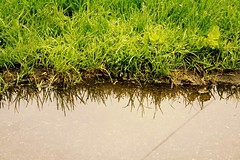
I recently finished a research project on bottled water. I was looking into the truecost of the product and found some very shocking facts. I also made an ad to illustrate my findings. It was very fun to get make into some graphic stuff. I'll share a bit of the information that i found.
Worldwide, $100 Billion are spent on bottled water each year. From 1999 to 2004 worldwide consumption rose to 154 billion litres from 98 billion: a 57 percent increase! Overall, these trends have turned bottled water into a $35 billion industry.
Although consumers are spending more on bottled water, are they getting what they pay for? The average price of bottled water exceeds that of gas in industrialized countries and cost up to 10,000 times more than tap water. Consumers are buying based on the assumption that bottled water is cleaner than tap water, however research shows this to be false.
A 1997 United Nations report and 2001 World Wildlife Fund study found that in Europe, Canada and the United States, “there are more regulations governing the quality of tap water than bottled water.” While in a 1997 United Nations Food and Agriculture Organization report, bottled water was found to contain no greater nutritional value than tap water. In fact, a Co-op America study found, “as much as 40 percent of bottled water is actually bottled tap water, sometimes with additional treatment, sometimes not.”
In addition to not being better than tap water, bottled water leaves a greater footprint on the earth. Nearly one quarter of all bottled water is transported across national borders. This means that immense cost is put into transporting it using fuel rather than using existing infrastructure.
Additional environmental damage is created from the mass quantities of natural ground water that is pumped to create bottled water. Because of the time it takes to replenish these sources, this water is considered a non-renewable resource.
This is only the tip of the iceberg because this water is then packaged in harmful polymer bottles for transportation. Worldwide, 2.7 trillion barrels of oil are used in the manufacturing of water bottles. Although PET (the plastic used in the process) is recyclable, 90% of bottles are thrown into regular trash streams to be incinerated. This process emits chlorine gas and heavy metal ash which are both toxic chemicals linked to human and animals health problems. If it isn’t incinerated it is placed in dumps where it takes over 1,00 years to decompose. Some bottles (40% of the US’s consumption) are shipped to foreign countries to be incinerated where pollution laws are more lax.
The bottle itself also leaches harmful chemicals into the water it is meant to protect. Additional studies found many bottled waters to contain numerous dangerous chemicals in high concentration.
The bottled water trend may seem like the “healthy option” however when you realize the real damage it does to the earth you may think twice. The amount of pollution created from transportation, disposal and the mass amount of ground water being pumped from the earth to make this product, bottled water is actually hurting us more than helping us.
For more check out...
Bottled Water: Nectar of the Frauds?
Message in a Bottle
Sierra Club - Corporate Water Privatization Committee
NRDC - Bottled Water: Pure Drink or Pure Hype?

3 comments:
I like your ad. I think it would also be cool/effective if you had picture of oil being poured out of a water bottle and into a drinking glass.
Regardless, I think there are tons of facts about bottled water that the public, and I, was not aware of. Society looks at the recycling symbol on the water bottle and thinks they are making the right decision for themselves and the environment around them. However, there is clearly more to it than that.
So what do we do? I think it would be an interesting marketing strategy to introduce another symbol, or maybe add-on to the existing recycling symbol to show society if they are doing the right thing when buying products like water bottles. When looking at the recycling symbol on a package, we tend to think it’s an environmentally friendly product –from start to end.
herbal viagra reviews viva viagra song viagra from canada women's viagra viagra online cheap viagra soft tabs viagra sample can viagra be used by women free viagra samples before buying guaranteed cheapest viagra viagra shelf life viagra and alternatives viagra online cheap viagra online cheap
Genial post and this mail helped me alot in my college assignement. Gratefulness you seeking your information.
Post a Comment